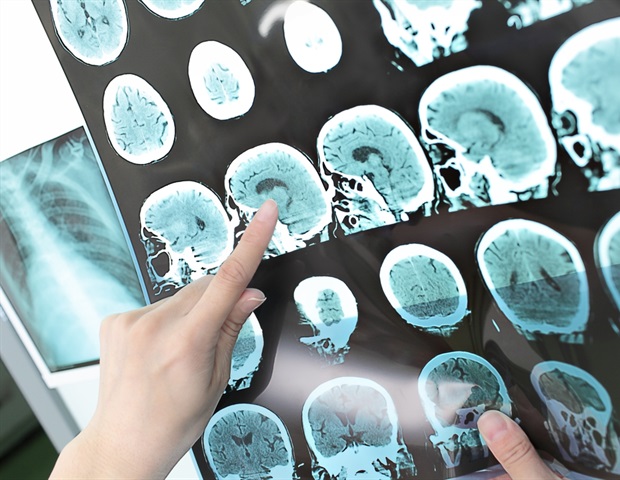Flossing your teeth at least once a week may be linked to a lower risk of stroke caused by a blood clot blocking brain blood flow and irregular...
Vous n'êtes pas connecté
- English
- Français
- عربي
- Español
- Deutsch
- Português
- русский язык
- Català
- Italiano
- Nederlands, Vlaams
- Norsk
- فارسی
- বাংলা
- اردو
- Azərbaycan dili
- Bahasa Indonesia
- Հայերեն
- Ελληνικά
- Bosanski jezik
- українська мова
- Íslenska
- Türkmen, Түркмен
- Türkçe
- Shqip
- Eesti keel
- magyar
- Қазақ тілі
- Kalaallisut ; kalaallit oqaasii
- Lietuvių kalba
- Latviešu valoda
- македонски јазик
- Монгол
- Bahasa Melayu ; بهاس ملايو
- ဗမာစာ
- Slovenščina
- тоҷикӣ ; toğikī ; تاجیکی
- ไทย
- O'zbek ; Ўзбек ; أۇزبېك
- Tiếng Việt
- ភាសាខ្មែរ
- རྫོང་ཁ
- Soomaaliga ; af Soomaali
 Maroc - NEWS.MEDICAL.NET - A la Une - 30/Jan 14:17
Maroc - NEWS.MEDICAL.NET - A la Une - 30/Jan 14:17
Rapid blood test could identify brain bleeds from clot-caused strokes
A blood test may rapidly distinguish brain bleeds from clot-caused strokes, even before people with stroke symptoms reach the emergency room, according to a preliminary study to be presented at the American Stroke Association's International Stroke Conference 2025.
Articles similaires
Rapid Blood Test Can Improve Stroke Treatment
FRIDAY, Jan. 31, 2025 -- A rapid blood test could speed treatment for people who’ve suffered a stroke related to brain bleeding, a new study...
Mediterranean diet linked to better brain health in Hispanic/Latino adults
Closely following a Mediterranean diet was associated with having better brain health among Hispanic/Latino adults in a preliminary study to be...
Prehospital Blood Test Can Rapidly Differentiate Stroke Types
FRIDAY, Jan. 31, 2025 -- Prehospital measurement of glial fibrillary acidic protein (GFAP) can rapidly differentiate intracerebral hemorrhage (ICH)...
Regular Flossing Can Prevent Strokes
FRIDAY, Jan. 31, 2025 -- Flossing protects your brain as well as your gums, a new study suggests.People who floss their teeth at least once a week...
Higher intensity walking program boosts mobility in stroke survivors
A progressively higher-intensity walking exercise program combined with standard physical therapy significantly improved the quality of life and...
Premature aging and cognitive decline could be detected by ECG tests and AI
Electrocardiogram tests may someday be used with an artificial intelligence (AI) model to detect premature aging and cognitive decline, according to a...
F.A.S.T. and BE-FAST equally effective in prompting 911 calls for stroke
When it comes to prompting people to call 911 at the first sign of stroke, both F.A.S.T. and BE-FAST stroke warning signs acronyms were equally...
Oral and gut bacteria in stroke patients associated with worse prognosis and mortality
A common bacteria usually found in the mouth and gastrointestinal tract, Streptococcus anginosis, may be abundant in the guts of people with stroke...
AI and ECG tests may help detect cognitive decline early
A new study suggests that electrocardiogram (ECG) tests, combined with artificial intelligence (AI), could one day help detect premature aging and...
Les derniers communiqués
-
Aucun élément






